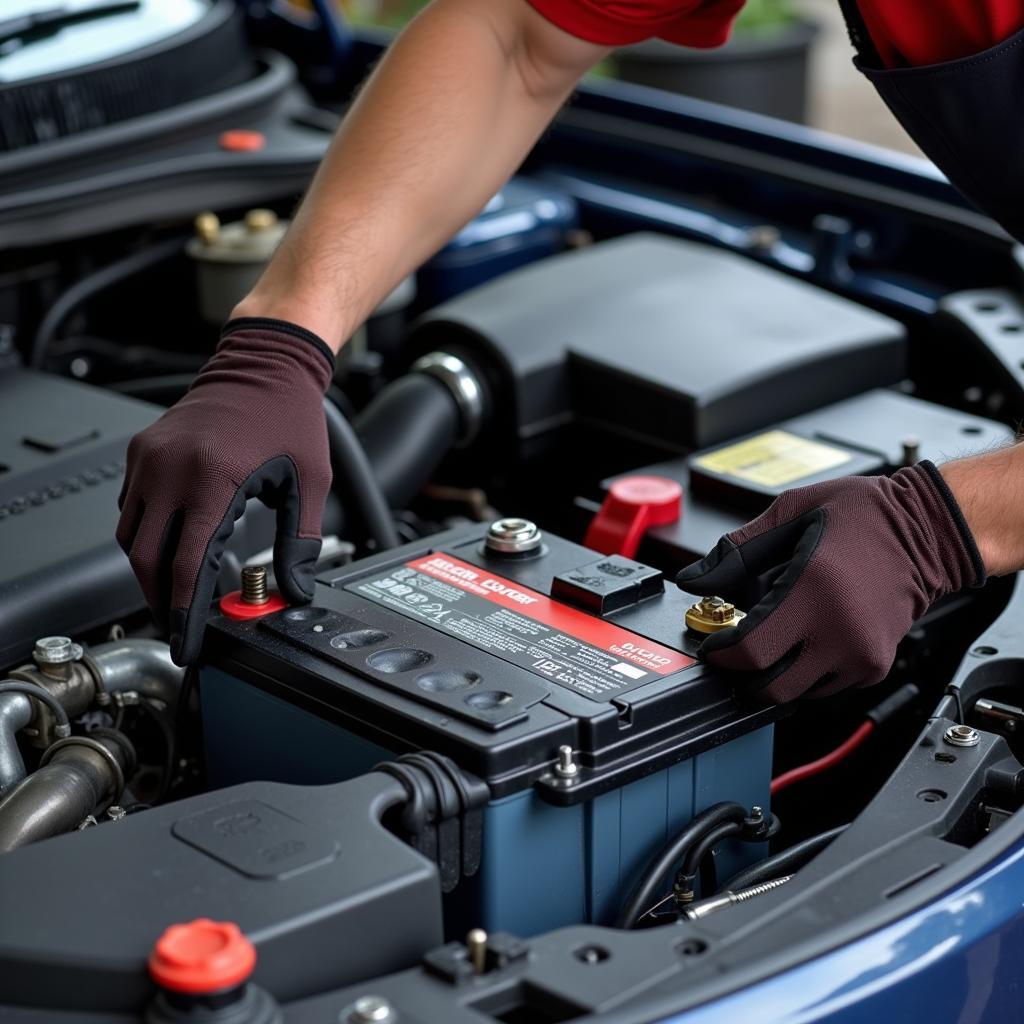A weak car battery can leave you stranded at the most inconvenient times. Recognizing the signs of a weak car battery is crucial for preventing breakdowns and ensuring your vehicle starts reliably. This article will guide you through the common symptoms, diagnostic procedures, and solutions for dealing with a weak car battery, offering expert advice and practical tips for keeping your car on the road. Learn how to identify a failing battery before it’s too late.
Common Signs of a Weak Car Battery
There are several telltale signs that indicate your car battery might be failing. Understanding these symptoms can help you address the issue proactively.
- Slow Engine Crank: This is often the first and most noticeable sign. When you turn the key, the engine cranks slowly or struggles to turn over.
- Dim Headlights: If your headlights appear dimmer than usual, especially when the engine is idling, it could be a sign of a weak battery.
- Clicking Sound When Starting: A rapid clicking sound when you turn the key suggests the battery doesn’t have enough power to engage the starter motor.
- Electrical Malfunctions: Problems with power windows, radio, or interior lights can indicate a weak battery struggling to provide sufficient power.
- Dashboard Warning Light: The battery or check engine light illuminating on your dashboard could signal a charging system problem or a weak battery.
- Swollen Battery Case: A physically swollen or bloated battery case is a clear indication of internal damage and requires immediate replacement.
- Old Battery Age: Car batteries typically last 3-5 years. If your battery is nearing or exceeding this lifespan, it’s more susceptible to failure.
 Slow Engine Crank Due to Weak Car Battery
Slow Engine Crank Due to Weak Car Battery
Diagnosing a Weak Car Battery
While the above signs are strong indicators, a proper diagnosis is crucial. Here’s how you can determine if your car battery is the culprit:
- Visual Inspection: Check for any physical damage, corrosion, or leaks on the battery.
- Battery Testing: Use a multimeter or a battery tester to measure the voltage. A fully charged battery should read around 12.6 volts.
- Load Test: A load test assesses the battery’s ability to deliver power under stress. This is a more accurate way to determine its health.
- Alternator Check: A failing alternator can prevent the battery from charging properly. Have it tested to rule out this possibility.
If you experience automatic car dead battery issues frequently, it’s crucial to get your battery and charging system checked. Similarly, if you’re facing a car battery working but not starting situation, diagnosing the underlying issue is essential. automatic car dead battery and car battery working but not starting offer further insights into these specific problems.
Solutions for a Weak Car Battery
Depending on the diagnosis, you have several options for addressing a weak car battery:
- Jump Starting: A jump start can get you back on the road temporarily, but it’s not a permanent solution.
- Battery Charging: If the battery is simply discharged, charging it with a battery charger might suffice.
- Battery Replacement: If the battery is old, damaged, or failing, replacement is the best course of action.
Knowing the failing car battery symptoms is the first step towards resolving the issue. failing car battery symptoms provides a comprehensive overview of these symptoms. For specific vehicle models, understanding the key fob battery replacement process is also important. For instance, volkswagen atlas key fob battery guides you through this process for Volkswagen Atlas owners. Addressing issues related to specific car models, such as the tata nexon petrol battery issue, can provide tailored solutions.
 Replacing a Car Battery
Replacing a Car Battery
Conclusion
Recognizing the signs of a weak car battery is vital for maintaining your vehicle’s reliability. By understanding the symptoms, diagnostic procedures, and solutions outlined in this article, you can take proactive steps to prevent breakdowns and ensure your car starts smoothly every time. Don’t let a weak car battery leave you stranded; take charge and address the issue before it becomes a major inconvenience.
FAQ
- How long does a car battery typically last? Most car batteries have a lifespan of 3-5 years.
- Can I jump start my car with a weak battery? Yes, but it’s a temporary fix. The underlying issue needs to be addressed.
- What causes a car battery to weaken? Age, extreme temperatures, excessive short trips, and parasitic drains are common causes.
- How can I test my car battery at home? You can use a multimeter or a battery tester to check the voltage and perform a load test.
- What should I do if my car battery is leaking? Wear protective gloves and goggles, and carefully disconnect the battery terminals. Consult a mechanic for proper disposal and replacement.
- Is it safe to drive with a weak car battery? It’s not recommended, as it can lead to breakdowns and potentially damage other electrical components.
- How can I prevent my car battery from weakening prematurely? Avoid short trips, limit accessory usage when the engine is off, and have your battery tested regularly.
